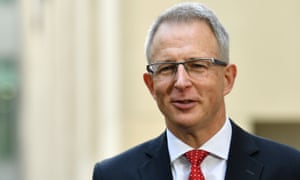Extract from The Guardian
Paul Fletcher and Labor’s Linda Burney questioned at welfare conference over lack of Newstart increase
New social services minister Paul Fletcher has been confronted by
Newstart recipients about the historically low rate of the unemployment
benefit, as he argued inequality in Australia was “not rising” at a
conference on Monday.
In his first major speech since taking up the role, Fletcher told the Australian council of social service (Acoss) conference in Sydney that claims of rising inequality in Australia were “factually inaccurate”.
Fletcher, who was appointed in August, was later confronted by audience members who expressed frustration at the government’s refusal to raise the rate of Newstart payments. The benefit has not risen in real terms since 1994.
Ivan, a Newstart recipient who said he had been diagnosed with depression and anxiety but was still “not good enough for the DSP”, asked Fletcher about the economic benefits of lifting Newstart.
Disability support pensioner Duncan Storrar, who made headlines for asking a question on Q&A, asked why the government did not have a yearly poverty report, which occurred while Bob Hawke was prime minister.In his first major speech since taking up the role, Fletcher told the Australian council of social service (Acoss) conference in Sydney that claims of rising inequality in Australia were “factually inaccurate”.
Fletcher, who was appointed in August, was later confronted by audience members who expressed frustration at the government’s refusal to raise the rate of Newstart payments. The benefit has not risen in real terms since 1994.
Ivan, a Newstart recipient who said he had been diagnosed with depression and anxiety but was still “not good enough for the DSP”, asked Fletcher about the economic benefits of lifting Newstart.
“I’d like to know whether the Liberal Party, or parliament, anyone in that big house in Canberra is going to sit down and work out a path out of poverty for us poor people who have to live in it year in and year out?” Storrar asked.
Fletcher said the government’s position on Newstart was “pretty well understood” and he did not plan to to “announce any change to our position”.
Labor’s shadow minister for social services, Linda Burney, was also grilled over the opposition’s failure to commit to an increase.
Burney described Labor’s position as “not a difference of view, a difference of timing” with Acoss. “There is agreement across the Labor Party now that Newstart is not adequate.”
She said Labor’s commitment to review the payment would be “short” and “rigorous”, would examine other payments, and allow her “to absolutely build the case for an increase in the rate of Newstart”.
She likened the review to the process that occurred during Gillard government that led to an increase in the pension.
Burney also twice said she expected the Newstart policy to be debated at the Labor conference later this year.
The Acoss chief executive, Cassandra Goldie, took issue with Fletcher’s speech, saying that “even if in your version things aren’t getting worse, they certainly aren’t getting better”.
“What we’ve heard in this room is the deep distress that’s being caused [to] people who are on the very lowest incomes in the country,” she said.
She also told Burney that Labor’s failure to make a pre-election commitment to increase Newstart while claiming it intended to tackle inequality in Australia “isn’t good enough”.
Arguing that inequality was not rising, Fletcher cited minimal changes to the Gini coefficient since 2007 and the Melbourne Institute’s Hilda survey since 2001.
Opponents argue that, measured over a few decades, the Gini coefficient shows inequality is the highest it has been for a generation. They also note the OECD has raised concerns about rising inequality in Australia.
Fletcher responded to a recent Acoss report that said more than three million Australians were living in poverty.
He noted the study tracked “relative income poverty” rather than “absolute poverty”.
“While it is an important measure it has its limitations,” Fletcher said.
“An increase in relative poverty could indicate that real incomes at the bottom of the distribution are falling – but it could equally mean they are holding up but there is strong growth in median or upper incomes.”

No comments:
Post a Comment